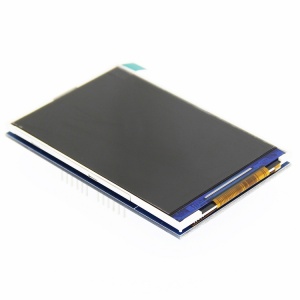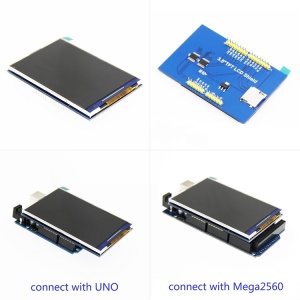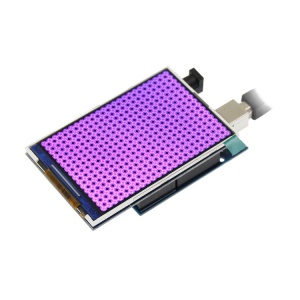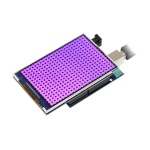More actions
Created page with "{{lan | cn=http://www.lcdwiki.com/zh/3.5inch_Arduino_Display-UNO | en=http://www.lcdwiki.com/3.5inch_Arduino_Display-UNO }} == <font color="blue">Product Video</fo..." |
No edit summary |
||
| Line 1: | Line 1: | ||
{{lan | {{lan | ||
| | | | ||
cn=http://www.lcdwiki.com/zh/3. | cn=http://www.lcdwiki.com/zh/3.95inch_Arduino_Display-UNO | ||
| | | | ||
en=http://www.lcdwiki.com/3. | en=http://www.lcdwiki.com/3.95inch_Arduino_Display-UNO | ||
}} | }} | ||
Revision as of 14:35, 29 March 2019
Product Video
Product Picture
Product Description
- Supports development boards such as Arduino UNO and Mega2560 for plug-in use without wiring
- 480X320 resolution, clear display, support for touch function
- Support 16-bit RGB 65K color display, display rich colors
- 8-bit parallel bus, faster than serial SPI refresh
- On-board 5V/3.3V level shifting IC, compatible with 5V/3.3V operating voltage
- Easy to expand the experiment with SD card slot
- Provides an Arduino library with a rich sample program
- Military-grade process standards, long-term stable work
- Provide underlying driver technical support
Product Parameters
| Name | Parameter |
| Display Color | RGB 65K color |
| SKU | MAR3501(have touch screen)/MAR3502(have no touch screen) |
| Screen Size | 3.5(inch) |
| Type | TFT |
| Driver IC | ILI9486 |
| Resolution | 480*320 (Pixel) |
| Module Interface | 8-bit parallel interface |
| Active Area | 73.44*48.96(mm) |
| Module PCB Size | 85.49*55.63(mm) |
| Operating Temperature | -20℃~70℃ |
| Storage Temperature | -40℃~70℃ |
| Operating Voltage | 5V/3.3V |
| Power Consumption | About 90mw |
| Product Weight | About 35(g) |
Interface Definition
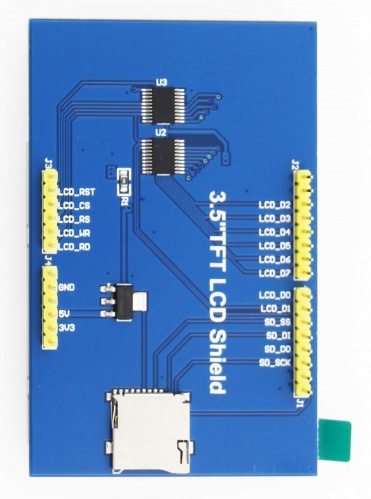
| Number | Pin Label | Pin Description |
| 1 | LCD_RST | LCD bus reset signal, low level reset |
| 2 | LCD_CS | LCD bus chip select signal, low level enable |
| 3 | LCD_RS | LCD bus command / data selection signal,
low level: command, high level: data |
| 4 | LCD_WR | LCD bus write signal |
| 5 | LCD_RD | LCD bus read signal |
| 6 | GND | Power ground |
| 7 | 5V | 5V power input |
| 8 | 3V3 | 3.3V power input, this pin can be disconnected |
| 9 | LCD_D0 | LCD 8-bit data Bit0 |
| 10 | LCD_D1 | LCD 8-bit data Bit1 |
| 11 | LCD_D2 | LCD 8-bit data Bit2 |
| 12 | LCD_D3 | LCD 8-bit data Bit3 |
| 13 | LCD_D4 | LCD 8-bit data Bit4 |
| 14 | LCD_D5 | LCD 8-bit data Bit5 |
| 15 | LCD_D6 | LCD 8-bit data Bit6 |
| 16 | LCD_D7 | LCD 8-bit data Bit7 |
| 17 | SD_SS | SD card SPI bus chip select signal, low level enable |
| 18 | SD_DI | SD card SPI bus MOSI signal |
| 19 | SD_DO | SD card SPI bus MISO signal |
| 20 | SD_SCK | SD card SPI bus clock signal |
Product Documentation
- 3.5 inch Arduino UNO Module User Manual
- 3.5 inch Arduino UNO Module Size Picture
- 3.5 inch TFT Specifications
- Driver IC ILI9486 Data sheet
Connect to Arduino
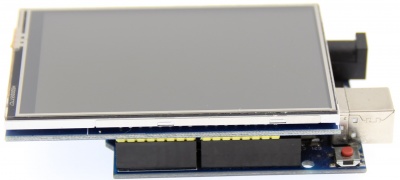
|
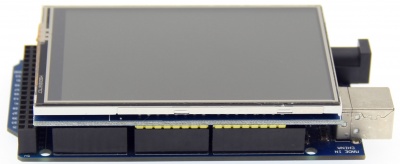
|
|---|---|
| Arduino UNO direct insertion picture | Arduino Mega2560 direct insertion picture |
How to use on Arduino
- Step 1: Download the test program
- Download the Arduino test program from the Program Download column
- For a description of the relevant test procedures, please refer to the test program documentation in the package
- Step 2: Connect the Arduino development board
- Plug the module directly into the Arduino development board ( Do not plug in?)
- After the module is plugged in, power on the Arduino board
- Step 3: Copy the dependent library
- Make sure the Arduino IDE is installed on your computer (if it is not installed: Arduino IDE download URL)
- After installing the Arduino IDE, you need to copy the dependent library to the Arduino project directory as follows:
- (1) Decompress the downloaded test package
- (2) Copy the dependent libraries in the Install libraries directory in the package (shown below) to the libraries folder
- of the Arduino project directory ( Don't know the Arduino project directory?)

- Step 4: Compile and download the program to the development board
- Open the sample in the Example directory of the package to test, compile and download( Don't know how to compile and download?)
- Step 5: Observe the running of the program
- After the program is downloaded, run it directly and observe the running status. If it can be displayed normally, the program runs
- successfully, as shown in the following figure (take the colligate_test test program as an example):
Program Download
Reference Materials
- Arduino IDE software use illustration
- C51 Keil and stc-isp software use illustration
- STM32 keil software use illustration
- PCtoLCD2002 software use illustration
- Image2Lcd software use illustration
- Chinese and English display modulo settings

